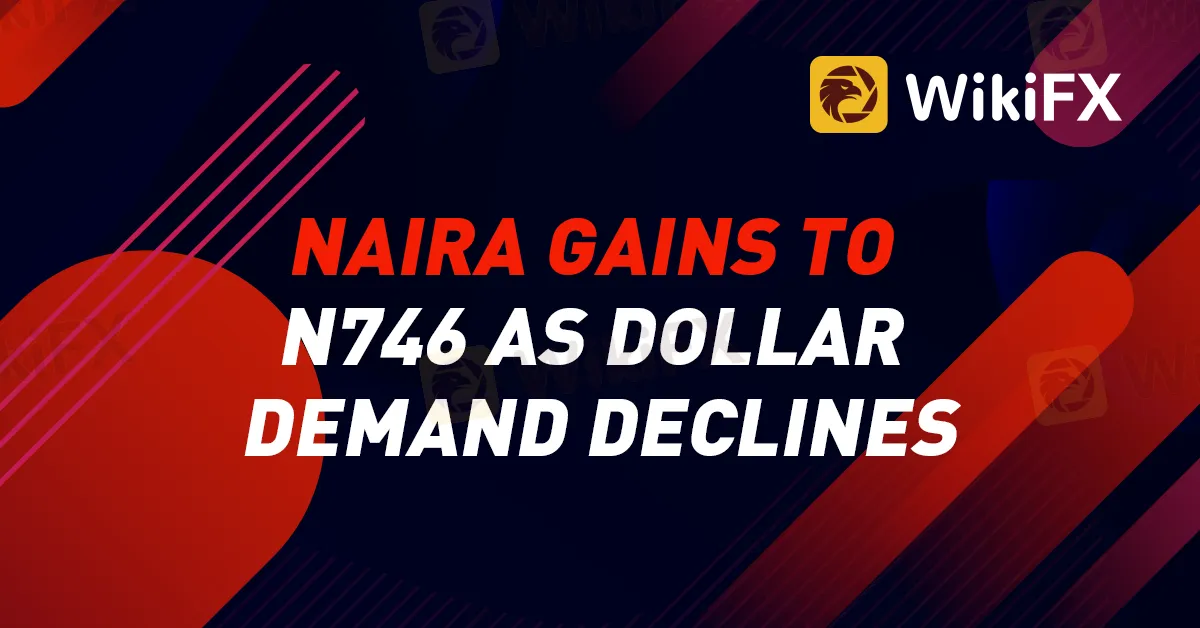简体中文
繁體中文
English
Pусский
日本語
ภาษาไทย
Tiếng Việt
Bahasa Indonesia
Español
हिन्दी
Filippiiniläinen
Français
Deutsch
Português
Türkçe
한국어
العربية
NAIRA GAINS TO N746 AS DOLLAR DEMAND DECLINES
Abstract:Nigeria's currency, the naira, gained 0.54 percent versus the dollar on Monday as demand for the dollar decreased in the so-called black market.

Nigeria's currency, the naira, gained 0.54 percent versus the dollar on Monday as demand for the dollar decreased in the so-called black market.
Monday's intraday trading saw the naira trading at N746 to the dollar, up from N750/$ exchanged the previous week. One merchant commented, “We are not seeing as much demand as before.”
Nigerians are still feeling the consequences of the currency crisis brought on by the CBN's naira redesign program, which began in October 2022, according to analysts at Cowry Asset Management Ltd. “The demand for the dollar in the foreign exchange (FX) market is now abating,” they wrote in a study.
The hint that Nigerian deposit money banks were planning to slash personal travel allowance (PTA) and business travel allowance (BTA) by 50% as the dollar crisis persisted led to another development in which FX scarcity persisted globally.
The Naira edged out the US dollar last week as it increased by N1.00 (or 0.13 percent) week-over-week to settle at N751/$ from 752/USD the week before, despite a slowdown in dollar demand that was aided by the Naira's scarcity.
The Naira strengthened by 0.04 percent at the Investors and Exporters (I&E) forex market on Friday as the dollar was quoted at N461.83 as opposed to Thursday's last closing of N462.00.
The majority of currency dealers who took part in the Friday FX auction kept their offers within the range of N460.00 (low) and N462.24 (high) per dollar.
According to the Cowry Asset report, the naira depreciated marginally on a weekly basis at the I&E forex window, falling 0.07 percent or N0.13 week on week to close at N461.83/$ as opposed to N461.50/$ the previous week, as a result of growing FX demand pressure on the naira following the announcement on the use of the old banknotes.
As compared to the dollar, the local currency lost 3.8 percent of its value in a single month, going from N737/$ at the start of the year to N755/$ by the end of February 2023.
According to a report by Bismarck Rewane, managing director/chief executive officer of Financial Derivatives Company Ltd, this was fueled by increased uncertainty as the naira currency constraint bites hard.
Rewane claims that Nigeria's sources of foreign money are still weak because of parallel market exchange rate premium, capital flow reversal brought on by global monetary tightening, and subpar oil production caused by oil theft.
Nigeria's external reserves, which were $37.21 billion as of January 17, 2023, are anticipated to fall to $34.9 billion by the end of 2023, according to the Nigerian Economic Summit Group, causing the official Naira to drop to N500 per $1. (NESG).
The CBN's involvement in the foreign exchange market and a lack of FX inflow at the end of 2023 will be the main causes of the reduction in the official foreign exchange reserves.
The nation's foreign exchange reserves fell by 8.2 percent in 2022, from US$40.5 billion at the beginning of the year to US$37.1 billion.

Disclaimer:
The views in this article only represent the author's personal views, and do not constitute investment advice on this platform. This platform does not guarantee the accuracy, completeness and timeliness of the information in the article, and will not be liable for any loss caused by the use of or reliance on the information in the article.
Read more

Space World Capital - The Forex Broker You Should Not Partner with
Explore this guide to know the scam of Space World Capital, which does not hold a regulatory license to operate forex business.

Crypto Craze Fizzling Out? Here is Why
The Crypto Craze among users is fading out. The wave of Cryptocurrency has slowed down. But what are the major reasons why this has happened?

Social Trading Goes Mobile at M4Markets
A new mobile application for social trading has been launched through a collaboration between brokerage firm M4Markets and fintech provider Brokeree Solutions

Forex Trading in Malaysia: Is It Halal Under Islamic Finance?
Forex trading has become increasingly popular around the world as a way to invest and manage currency risks. In Malaysia, where a large part of the population follows Islam, many traders often ask whether forex trading is halal or haram under Islamic law.
WikiFX Broker
Latest News
WikiFX Gala Night Malaysia Concludes Successfully
IG Group Unlocks Over £425 Million amid a Capital Reduction
Elon Musk's xAI raises $10 billion in debt and equity as it steps up challenge to OpenAI
European Central Bank's tightening cycle is done,' chief economist says
ACY Securities Expands Crypto CFD Offering with 24/7 Trading Access
Stock futures fall after S&P 500 notches new record to cap winning second quarter: Live updates
How to Predict Forex Profits with a Profit Margin Calculator
Revelation: Makeup Artist, Social Media Influencer Involved in INR 1.62 Cr Forex Trading Scam
Social Trading Goes Mobile at M4Markets
CNBC Daily Open: Keep calm and carry on, investors
Currency Calculator


